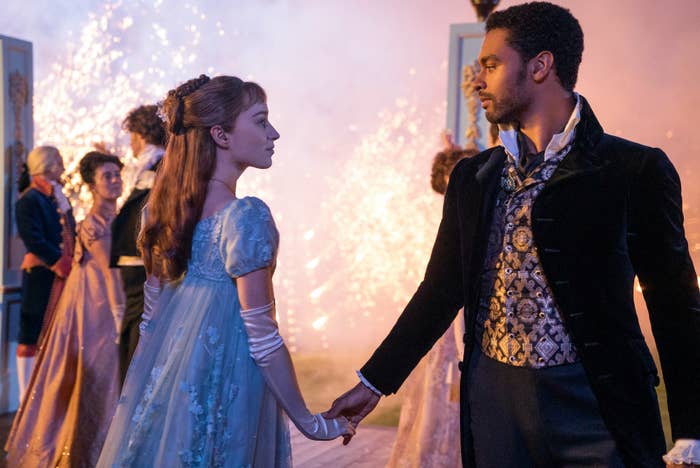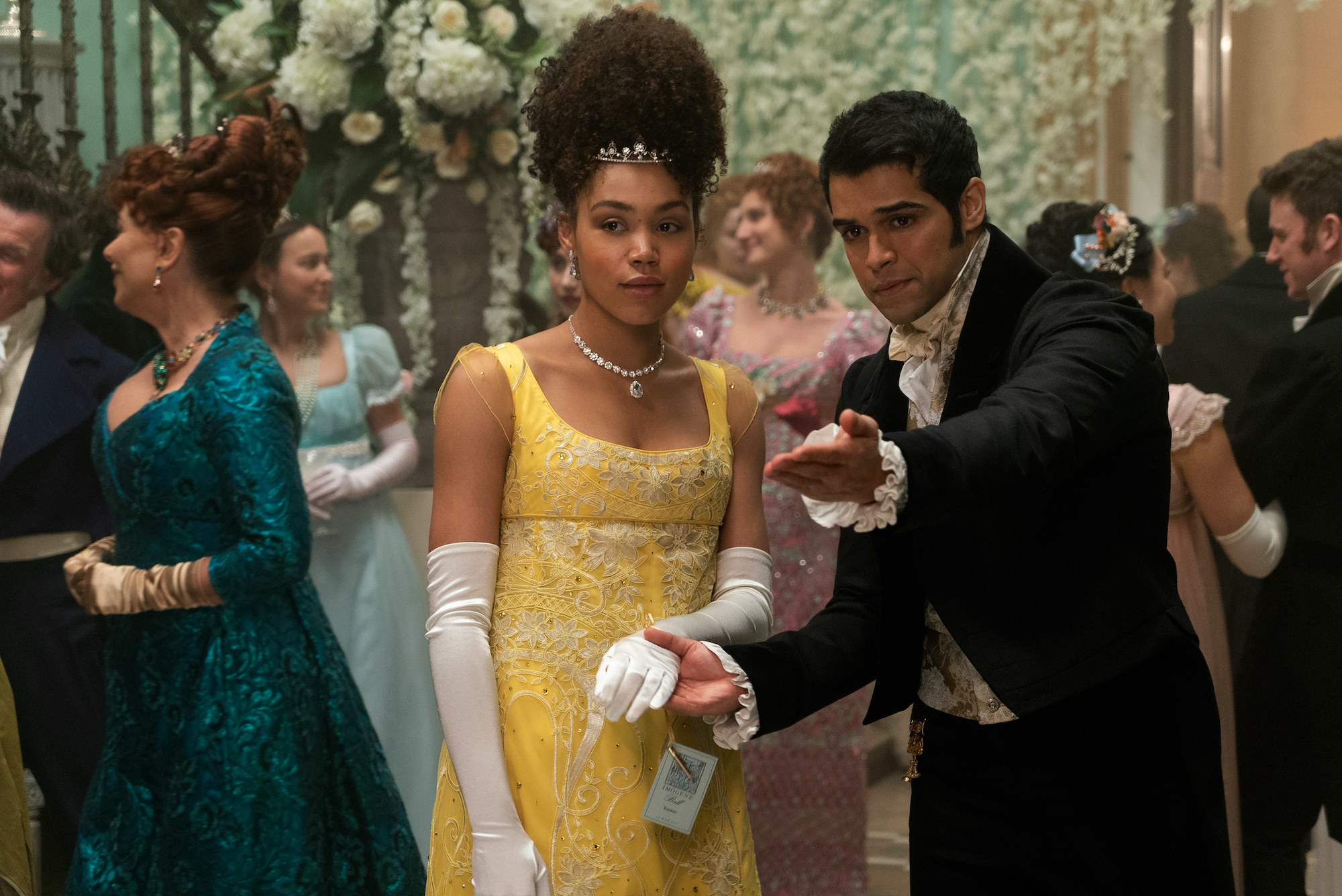
Is there any bigger letdown than being disappointed by a show that, in theory, is something you should enjoy?
Recently, I had the displeasure — emphasis on dis — of watching Netflix’s Bridgerton, the highly anticipated series about 18th-century British high society, which is out on Christmas Day. Created by Chris Van Dusen and produced by iconic showrunner Shonda Rhimes, who created both Grey’s Anatomy and Scandal, the show is based on the bestselling historical romance novels by author Julia Quinn. Bridgerton is the first of eight projects Rhimes is producing for Netflix after she struck a massive deal (purportedly worth more than $100 million) with the streamer back in 2017. Naturally, I was keen to see what she’d come up with.
Set in 1800s London, a world where royalty and nobility espouse modest ideals in one breath while contradicting them in the next, the show looked like a Gossip Girl–esque update to Jane Austen. The trailer promised scandal, intrigue, and forbidden dalliances among a small faction of people to whom appearances mean everything — a world where even the slightest whiff of impropriety could mean social ruin, especially for women. The trailer also highlighted several Black characters who would be prominently featured throughout the series, an exciting update to the usually overwhelmingly white Regency-era London. It physically pains me, as a homosexual, to say that not even the inclusion of Julie Andrews as the narrator, Lady Whistledown, an anonymous writer who produces a pamphlet detailing the sordid lives of these upper-crust folks, was enough to save the show. Alas. I was bored to tears for the majority of each of the eight hourlong episodes, which, quite frankly, could’ve been a smooth six — maybe even five!
The one thing I crave more than anything in the midst of the pandemic is an escape from the confining walls of my apartment. And while Bridgerton held so much promise, with A-list talent, a legendary producer, interesting source material, and sumptuous sets, the end product turned out to be mind-numbingly dull. Spoilers ahead.
It physically pains me, as a homosexual, to say that not even the inclusion of Julie Andrews as the narrator was enough to save the show.
The story begins with Daphne Bridgerton (Phoebe Dynevor), a young, aristocratic white woman eligible for marriage. Along with hundreds of other women in the same position, she makes her way to the palace to see the Queen, who determines which of them will likely be the most sought-after for the upcoming marriage season. Daphne, dressed in all white, somehow woos the monarch merely by stepping forward and curtsying; soon after, Lady Whistledown’s mysterious pamphlets begin circulating, deeming Daphne an incomparable catch.
But there’s a wrench thrown into Daphne's plans to find the perfect suitor. Her prospects quickly dwindle when a young Black woman, Marina Thompson (Ruby Barker), comes to town to live with her cousins and begins to attract more suitors. Meanwhile, a much older gentleman, Nigel Berbrooke (Jamie Beamish), begins to pursue her. Once Daphne, who ultimately wants to marry for love, finds out that her brother had promised her to Nigel, she storms out of a party and into a garden area called “the Dark Walk,” where it’s implied that nothing but debauchery takes place.
Nigel runs after Daphne and attempts to charm her at first, but she bruises his ego by letting him know she doesn’t want to marry him. “I'm your last hope. No one wants you, Miss Bridgerton,” he says. A scuffle ensues, and Daphne punches her spurned suitor, knocking him to the ground. Moments later, the handsome playboy duke, Simon Basset (Regé-Jean Page), shows up; Daphne is mortified thinking about the conclusions people might draw knowing she was in the area with not one but two men. It’s here that the two concoct a master plan: They will pretend to date in order to raise Daphne's prospects of finding a more suitable mate. Simon agrees because it will keep people from asking him when he’s going to settle down.
This storyline seems promising enough, but things quickly go downhill after the first episode. For starters, the setup is incredibly predictable. Daphne and Simon spar with one another, but there are moments in their budding pretend relationship when you can tell they’re developing genuine feelings. This is fine, but it takes entirely too long for either of them to confess this, thus chipping away at viewers’ investment and interest in the relationship. They don’t even have sex until the fifth episode. And when they do, the sex is hardly titillating. (There’s also a disturbing scene later in the series when Daphne forces Simon to ejaculate inside her in an attempt to get pregnant.)
And perhaps this is me expecting too much, but the show’s reluctance to acknowledge race is odd. Bridgerton brings to life a society, which is — and was — a lot more diverse than other works of art that have highlighted this particular era might have you believe. But while the show depicts a number of interracial couples — which isn’t inherently an issue, as most of the shows produced by Rhimes feature many interracial couples — it refuses to address race at all.
As Vulture staff writer Kathryn VanArendonk noted: “Bridgerton’s diversity backstory feels warm yet half-baked, as though the writers were eager to include a rationale but not all that interested in dealing with the less pleasant ramifications.” Why are there still so few people of color highlighted in the upper echelon if this world is truly ignorant of race? And how do the members of the Black aristocracy feel about the trade of enslaved people? All the interesting things the show could have said about race are sidelined in favor of its feminist bent, which it leans into heavily.

One of the clearest examples of how race is poorly handled on the show is its focus on the character Marina Thompson. She endures an excessive amount of scrutiny from Lady Portia Featherington, first because she sees her as a threat to her daughter’s prospects of finding a decent suitor and later because of her pregnancy. Though the show makes an effort to demonstrate how women must be shrewd in order to survive the oppressive society in which they were born, the stakes almost always feel much higher for Marina, than, say, Daphne. A misstep for Marina, as a woman of color, could be cataclysmic, whereas Daphne, who has the support of her family, likely wouldn’t suffer the same fall from grace, not only because of her privilege but because she is white.
Why are there still so few people of color highlighted in the upper echelon if this world is truly ignorant of race?
For Vox, Aja Romano wrote about the series’ “shallow” approach to this character, saying, “Instead of fueling an interesting exploration of how the aristocracy might react to a poor, clever woman of color like her, she gets turned into a device for drama between the Bridgertons and Featheringtons. She’s used to center the Featheringtons' own issues with class, money, and race; then she’s used to raise questions of informed consent surrounding her attempts to marry well.”
The show touts Marina’s duplicitous decision to marry an eligible Bridgerton bachelor as a difficult choice for any woman in this society to make. But it feels a bit peculiar to place one of the show’s few women of color leads in this particular position without any added context. Though things work out in the end, there’s an uneasy feeling with how Marina is villainized, something that could have been more interesting and nuanced if race were presented in a more complex fashion.
In a recent interview, Page, who plays the duke, told Women’s Wear Daily, “I think the most startling thing that I realized when I watched it was that [race is] the least relevant thing onscreen within seconds.” “You’re just engaging with these characters on a very universal, human level, in terms of everyone is trying to find their sense of identity, despite the societal barriers and restrictions that are put in their way.” There are no hard-and-fast rules that say historical fiction must make a commentary on race, but it feels weird that the most subversive thing about a show adapted from a majority-white book series is that some of the characters are a few shades darker. It ultimately just feels hollow — but, unlike me, your mileage may vary.
Bridgerton’s mediocrity has made me skeptical and less optimistic about Rhimes’ forthcoming Netflix projects, like The Warmth of Other Suns, which will bring to life author Isabel Wilkerson’s deeply researched award-winning book about the Great Migration, and Inventing Anna, based on the Cut article about the grifter Anna Sorokin. Looking at a show like Bridgerton, you can tell a lot of time and resources went into its production — but the number of barely watchable shows being produced by these high-profile creators has been frustrating.
Ryan Murphy, another wave-making showrunner at Netflix, has made a slew of productions since joining the streamer that have not been critical darlings, from The Politician (which I liked!) to the uninspired and hollow Hollywood and Ratched, which, much like Bridgerton, is pretty to look at but bad in virtually every other way. Murphy’s shows suggest that while the network has nabbed top talent, it doesn’t necessarily mean the programs will be great. Perhaps Rhimes and company are still just warming up, which is fine, but like Olivia Pope once said, “If you want me, earn me!” ●
